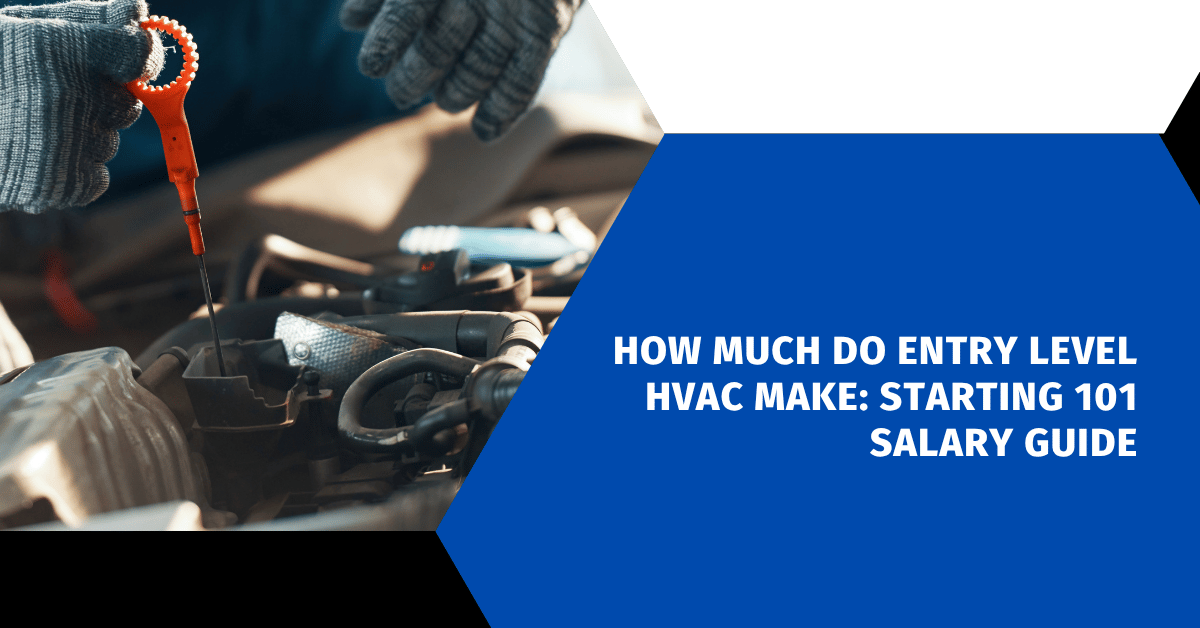Affiliate Disclosure
HVAC Guide Guys is a participant in the Amazon Services LLC Associates Program, an affiliate advertising program designed to provide a means for sites to earn advertising fees by advertising and linking to Amazon.
How Much Do Entry Level HVAC Make? Are you thinking about a career that’s both rewarding and well-paid? HVAC might be the answer. It offers stability, growth, and good pay from the start.

The HVAC field is full of chances for those looking for a hands-on job. You’ll find out that entry-level HVAC jobs have great starting salaries and lots of room to grow.
The Bureau of Labor Statistics says entry-level HVAC techs get good pay right off the bat. Starting this career could bring you financial security and career growth sooner than many jobs.
Key Takeaways
- Entry-level HVAC technicians earn competitive starting wages
- Median annual wage for HVAC professionals is around $57,300
- Starting salaries can begin near $37,000 per year
- Career offers rapid skill development and advancement
- Technical certifications can boost initial earnings
Table of Contents
Understanding Entry-Level HVAC Salaries Nationwide
Starting a career in HVAC can be exciting. Knowing how much you can earn as a beginner is key. The HVAC industry offers good pay for those just starting out.
National Average Base Pay
The national average salary is a good starting point. HVAC technicians can earn between $37,000 and $45,000 a year. Several things affect this:
- Where you live
- What kind of HVAC work you do
- Your technical skills and certifications
- Who you work for
Salary Range for Beginners
How much you earn as a beginner can vary a lot. Some start at $32,000, while others can earn up to $48,000. Urban areas usually pay more than rural ones.
Regional Variations in Starting Pay
Salaries vary across the U.S. because of different costs of living and economic conditions. Coastal and big city areas often pay more to new technicians.
“Your location can make a substantial difference in your initial earning as an HVAC professional.” – Industry Expert
Knowing about these salary differences helps you plan better. It can help you earn more from the start in HVAC.
Explore Our HVAC Shop
Looking for top-rated HVAC tools, parts, and accessories? Visit our shop and find the perfect solution for your needs.
Visit the ShopTop-Paying States for Entry-Level HVAC Technicians
When looking at novice hvac installer pay, some states are better than others for newbies in HVAC. Your first-year salary can change a lot based on where you start your career.
Some places pay beginners more than the national average. Here are the best spots for new HVAC techs:
- Colorado: Known for competitive wages and robust construction markets
- Connecticut: High demand for HVAC services drives excellent compensation
- Maryland: Strong infrastructure and industrial growth support higher starting salaries
- Massachusetts: Technical innovation creates premium pay opportunities
- California: Urban centers offer attractive compensation packages
Knowing how salaries vary by region can help you plan your career. Cities usually pay more, but rural areas might have lower costs of living.
| State | Average Entry-Level Salary | Cost of Living Index |
|---|---|---|
| Colorado | $48,500 | 107.6 |
| Connecticut | $52,300 | 116.8 |
| Maryland | $47,800 | 103.2 |
| Massachusetts | $51,600 | 135.0 |
| California | $49,700 | 151.7 |
Where you choose to work can greatly affect your starting salary. Look into local job markets, think about living costs, and pick a place that offers good chances for new HVAC pros.
How Much Do Entry Level HVAC Make in Different Work Settings
The HVAC industry has many work settings, each with its own pay for new technicians. Choosing where you work can greatly affect how much you earn and your career path.
It’s important to know how much entry-level HVAC workers make in different places. Each setting offers its own chances and challenges for new techs.
Commercial HVAC Starting Salaries
Commercial HVAC jobs usually pay well for new workers. These jobs are in big buildings, offices, and schools. Starting salaries can be between $35,000 and $45,000 a year.
- Larger commercial projects often provide more consistent work
- Complex systems require specialized knowledge
- Potential for faster skill development
Residential HVAC Initial Wages
Residential HVAC is a common starting point for technicians. It deals with heating, cooling, and ventilation in homes. Starting salaries are usually between $32,000 and $40,000 a year.
- More direct customer interaction
- Varied daily work environments
- Opportunities for building a personal client base
Industrial HVAC Entry Positions
Industrial HVAC jobs are the most specialized and often pay the most. They need advanced skills and are in complex manufacturing or processing areas.
- Highest starting wages: $40,000 to $50,000
- More technical training required
- Specialized equipment knowledge
Your earnings will depend on location, skills, and certifications. Knowing the local market can help you find the best entry-level HVAC jobs.
Explore Our HVAC Shop
Looking for top-rated HVAC tools, parts, and accessories? Visit our shop and find the perfect solution for your needs.
Visit the ShopExperience-Based Salary Progression in HVAC

Your hvac career starts with entry-level pay. But, learning new skills can really up your income. As an HVAC apprentice, you start at $12 to $18 an hour. You can move up quickly.
Your pay can grow in several ways:
- Completing apprenticeship programs
- Getting specialized certifications
- Improving your technical skills
- Getting more experience with complex systems
The salary for HVAC techs goes up as you get more experience. Your first two years as an apprentice are key. You’ll earn more as you show you can handle technical tasks well.
| Career Stage | Typical Hourly Wage | Annual Earnings |
|---|---|---|
| Apprentice (0-2 years) | $12 – $18 | $25,000 – $37,440 |
| Journeyman (3-5 years) | $20 – $25 | $41,600 – $52,000 |
| Senior Technician (6+ years) | $26 – $35 | $54,080 – $72,800 |
Overtime in busy seasons can really boost your pay. Focusing on commercial or industrial HVAC can also help you earn more.
Invest in continuous learning and skill development to maximize your earning in the HVAC industry.
Essential Certifications and Their Impact on Starting Pay
Getting into HVAC certifications can really boost your starting pay. These credentials show you’re skilled and can lead to better jobs.
When you start in HVAC, some certifications can make a big difference. Getting the right certifications can make you stand out from others.
EPA Certification Benefits
The Environmental Protection Agency (EPA) certification is key for HVAC techs. It lets you:
- Work with refrigerants legally
- Be more attractive to employers
- Maybe earn 10-15% more at first
NATE Certification Value
North American Technician Excellence (NATE) certification is top-notch. It shows you’re an expert and can help you earn more.
State-Specific License Requirements
States have their own rules for licenses, affecting your first salary. Some important ones are:
- Ground Source Heat Pump Loop Installer
- HVAC Performance Verifier
- Gas Heating Specialist
- Heat Pump Technician
Getting these certifications shows you’re serious about your career. It can give you an edge in salary talks.
Explore Our HVAC Shop
Looking for top-rated HVAC tools, parts, and accessories? Visit our shop and find the perfect solution for your needs.
Visit the ShopUrban vs Rural HVAC Starting Salaries

Exploring hvac rookie earnings shows a big difference between urban and rural areas. Your location greatly affects how much you earn as a novice hvac installer. This creates both chances and challenges.
In cities, like New York, Chicago, and Los Angeles, you can earn more. Metropolitan areas usually pay more because of high demand and complex systems.
- Urban HVAC Starting Salary Range: $35,000 – $48,000
- Rural HVAC Starting Salary Range: $28,000 – $38,000
Rural areas offer unique benefits for new HVAC workers. Even though starting pay might be lower, the cost of living is also lower. Rural settings often have:
- Lower living expenses
- Less competitive job markets
- Potential for faster career advancement
- More personalized work environments
When planning your career, think about both salary and quality of life. Some prefer rural areas for less stress and better work-life balance, even with lower earnings.
Strategic career planning involves evaluating total compensation, not just base salary.
Your success depends on your skills, certifications, and flexibility. Whether in cities or rural areas, hard work and the right strategy can lead to a fulfilling career.
Benefits and Compensation Packages for Entry-Level Positions
Starting your HVAC career means understanding your compensation package. Entry-level HVAC helpers get more than just a salary. They also get a benefits package that boosts their total earnings.
Companies want to keep skilled technicians. They offer great benefits to help you grow and stay healthy.
Health Insurance Options
Most HVAC jobs come with excellent health insurance. You’ll find:
- Medical insurance with various plan levels
- Dental coverage
- Vision care plans
- Prescription drug benefits
Retirement Plans
Starting to save for retirement early is smart. Many jobs offer:
| Retirement Plan | Typical Employer Contribution |
|---|---|
| 401(k) Plan | Up to 4-6% match |
| Roth IRA Support | Additional contribution options |
Additional Perks
Some HVAC jobs offer more than usual benefits:
- Paid time off
- Tool allowances
- Tuition reimbursement
- Performance bonuses
- Professional development opportunities
Look at the whole compensation package when choosing a job. Your total value is more than just your salary. These benefits can greatly increase your earnings and career growth.
Career Growth and Salary Advancement Opportunities
Starting as an HVAC technician opens doors to many career paths. You can grow and increase your salary over time. Begin with an entry-level job and work your way up by improving your skills.
There are several ways to advance in your career:
- Lead Technician: Supervise team projects and mentor junior technicians
- Service Manager: Oversee entire service departments
- Operations Manager: Manage multiple teams and business operations
- Specialized Technician: Focus on complex HVAC systems or specific technologies
To boost your starting salary, follow these steps:
- Pursue advanced certifications
- Develop specialized technical skills
- Gain experience in diverse HVAC environments
- Network within professional industry associations
Entrepreneurial technicians can start their own HVAC service businesses. This can greatly increase their earnings.
| Career Stage | Potential Salary Range | Skill Requirements |
|---|---|---|
| Entry-Level Technician | $35,000 – $45,000 | Basic technical knowledge |
| Experienced Technician | $50,000 – $65,000 | Advanced certifications |
| Lead Technician | $65,000 – $80,000 | Management skills |
| Service Manager | $80,000 – $100,000 | Leadership experience |
Keep learning, stay up-to-date with new technologies, and plan your career. This way, you can have a fulfilling and profitable HVAC career.
Explore Our HVAC Shop
Looking for top-rated HVAC tools, parts, and accessories? Visit our shop and find the perfect solution for your needs.
Visit the ShopMarket Demand and Job Outlook for New HVAC Technicians
The HVAC industry is booming, creating great chances for those interested in HVAC jobs. The latest labor market forecasts show a bright future for new HVAC technicians.
Industry Growth Projections
The Bureau of Labor Statistics predicts big growth in the HVAC field. From 2023 to 2033, HVAC technician jobs are set to grow by 9%. This means about 37,700 new jobs every year.
- 9% projected job growth through 2033
- 37,700 annual job openings
- Strong demand across multiple sectors
Employment Trends
Several factors are boosting HVAC apprentice wages and job chances:
- More construction work
- More focus on energy-saving systems
- Need to replace older workers
- New HVAC technologies
Geographic Hotspots
Job chances differ by area, with some places better for new HVAC techs.
| State | Job Growth | Average Entry-Level Wage |
|---|---|---|
| Texas | High | $42,000 |
| California | Very High | $45,000 |
| Florida | High | $40,000 |
Your future in HVAC looks bright. With good planning and skill growth, you can make the most of these trends and have a fulfilling career.
Conclusion
Exploring entry-level HVAC technician pay opens up great chances for new professionals. Your starting salary can be around $35,000 to $45,000 a year. This can grow a lot. It’s important to know how certifications, location, and job settings affect your pay.
Getting EPA and NATE certifications can really increase your earnings. Cities and states like California, Texas, and New York usually pay more. Your first job is just the start of a promising HVAC career.
Your success comes from learning and being flexible. Keep up with industry news, get more training, and be open to different jobs. The HVAC field offers good pay, stable jobs, and chances to move up.
Start your HVAC career by building a strong base of skills, certifications, and experience. Your hard work and smart planning can turn your first job into a fulfilling and profitable career.

